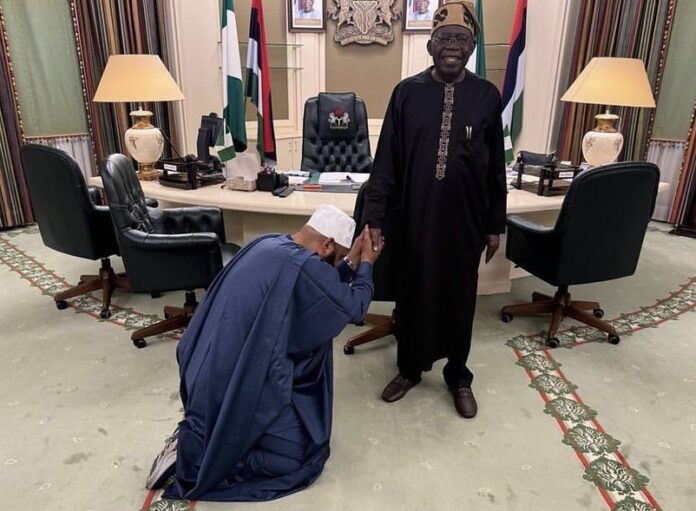President Tinubu, we need to talk. It’s no secret that Nigeria is in the thick of a rough patch, and it feels like we’re all just trying to hang on. The economic situation is dire, and every day brings a new challenge that makes it hard to see a clear path forward. We need a sense of urgency from your administration—something tangible that shows you’re on top of this and ready to act decisively.
First off, let’s talk about the elephant in the room: the economy. Inflation is biting hard. Prices are skyrocketing, and it feels like our money doesn’t stretch as far as it used to. Everyday items that we once took for granted are now luxuries. Many Nigerians are struggling just to keep up with the cost of basic necessities. It’s like watching a slow-motion train wreck, and it’s only getting worse.
You’ve had a front-row seat to how serious this is. The pain at the pump, the hike in food prices, the steep cost of transportation—these aren’t just statistics; they are the reality for millions of Nigerians. We need more than just statements and reassurances; we need real, actionable plans. We need to see that you’re not just aware of the problem, but actively working to fix it.
One place to start would be addressing the fuel subsidy issue. It’s a hot potato, but it’s also an urgent matter. The removal of fuel subsidies, while necessary for long-term economic health, has been implemented in a way that has exacerbated the pain. The immediate aftermath has left many in a tough spot, and the promised support systems haven’t materialized as quickly as we hoped. How about pushing for a clear timeline and concrete steps to cushion the effects while we transition? Transparency here can go a long way in maintaining public trust.
Next, let’s not overlook the issue of unemployment. The youth unemployment rate is alarmingly high, and it’s not just a statistic—it’s a crisis that threatens the very future of our nation. We need robust job creation strategies that go beyond just talking about diversifying the economy. We need targeted programs that foster small and medium-sized enterprises (SMEs) and provide support for startups. Investing in technology and innovation hubs can be a game-changer. After all, our young people are brimming with talent and ideas; they just need the right environment to flourish.
Another pressing issue is security. The sense of insecurity across various parts of the country is palpable. The rise in violent crimes, kidnappings, and insurgent activities is not just a threat to our safety but also to our economic stability. The government’s primary role is to protect its citizens, and addressing these security challenges needs to be a top priority. This isn’t just about increasing military presence but also about implementing effective community-based strategies to address the root causes of violence and insecurity.
Furthermore, let’s talk about governance and public service delivery. There’s a growing frustration with bureaucracy and inefficiency. Many Nigerians feel like they’re constantly navigating a maze of red tape just to access basic services. Streamlining these processes, digitizing public service functions, and ensuring accountability in government dealings can restore faith in the system. People need to see that their tax money is being put to good use and that the government is working efficiently on their behalf.
On the topic of transparency, it’s crucial that the government leads by example. Corruption has been a persistent issue, and it undermines every effort to improve our situation. Strengthening anti-corruption measures, ensuring that public officials are held accountable, and fostering a culture of integrity are essential steps toward rebuilding trust. When the people see that their leaders are committed to fighting corruption, it gives them hope that things can get better.
And while we’re at it, let’s not forget about education. Investing in education isn’t just a long-term goal; it’s a critical component of our immediate future. We need to ensure that our education system equips students with relevant skills that meet the demands of the modern job market. This involves not just improving infrastructure but also focusing on curriculum reforms and teacher training. Our youth are our greatest asset, and giving them the tools to succeed is an investment in our collective future.
President Tinubu, I’m not just venting frustration; I’m voicing the concerns of millions of Nigerians who are feeling the weight of these issues every single day. The current situation demands more than just incremental changes. It calls for bold, decisive action that demonstrates a clear commitment to addressing the pressing problems facing our nation.
We’re looking for leadership that doesn’t shy away from tough decisions and that prioritizes the well-being of its people. We need to see action plans that are not just on paper but that translate into real improvements in people’s lives. We need to know that you understand the urgency of the situation and that you’re willing to tackle these challenges head-on.
The road ahead isn’t easy, and the stakes are incredibly high. But history has shown us that in times of crisis, strong and visionary leadership can make a profound difference. We’re at a crossroads, and the choices made in this moment will shape the future of our country.
So, President Tinubu, the time for talk has passed. The people are looking to you for action. The need for quick, effective solutions is greater than ever. We’re counting on you to rise to the occasion, to address these issues with the urgency they demand, and to steer Nigeria toward a brighter, more stable future.

